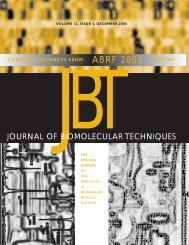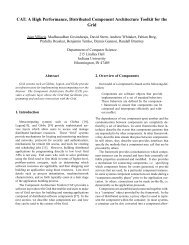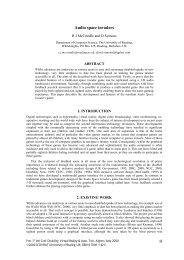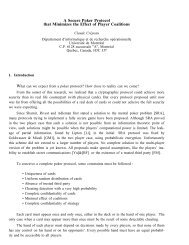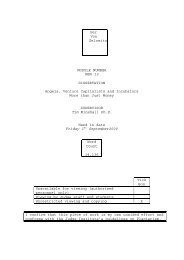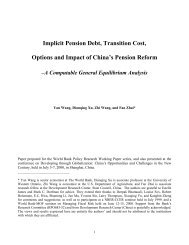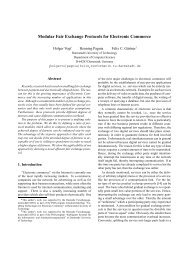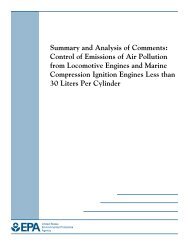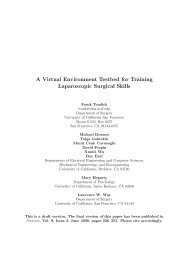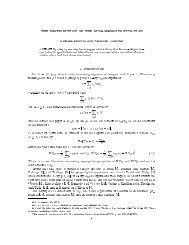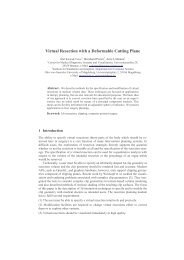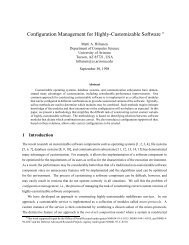Hydrology and water management in the humid tropics: proceedings ...
Hydrology and water management in the humid tropics: proceedings ...
Hydrology and water management in the humid tropics: proceedings ...
You also want an ePaper? Increase the reach of your titles
YUMPU automatically turns print PDFs into web optimized ePapers that Google loves.
Second International Colloquium on<br />
<strong>Hydrology</strong> <strong>and</strong> Water Management <strong>in</strong> <strong>the</strong> Humid Tropics<br />
• Exist<strong>in</strong>g experimental hydrology be<strong>in</strong>g undertaken at <strong>the</strong> microscale, < 10<br />
Km 2 , too small to be of practical use for <strong>in</strong>tegrated <strong>water</strong> resource<br />
<strong>management</strong> (usually up to <strong>the</strong> meso-scale of 10,000 km 2 or even larger). One<br />
should acknowledge here, however, that <strong>the</strong> micro-scale work has made<br />
considerable contributions to <strong>the</strong> improvement of on-site <strong>management</strong><br />
practices. But it is also important that research is upscaled from <strong>the</strong> traditional<br />
small cathchment to <strong>the</strong> larger dra<strong>in</strong>age bas<strong>in</strong> scales which are of more <strong>in</strong>terest<br />
to <strong>water</strong> planners who need urgent <strong>management</strong> solutions now.<br />
• The development of models has far surpassed field test<strong>in</strong>g <strong>and</strong> field<br />
parameterisation at <strong>the</strong> appropriate scale.<br />
• The need for greater attention be<strong>in</strong>g given to surface-ground<strong>water</strong> <strong>in</strong>teractions,<br />
ra<strong>the</strong>r than traditionally keep<strong>in</strong>g <strong>the</strong> subject areas separate. The escalation <strong>in</strong><br />
socio-economic pressures is caus<strong>in</strong>g a rapid degradation <strong>in</strong> <strong>water</strong> quality<br />
across this region. It is <strong>the</strong>refore fitt<strong>in</strong>g that a session of this Colloquium will<br />
be devoted to this topic of particular importance. Fur<strong>the</strong>rmore, <strong>in</strong>creas<strong>in</strong>g our<br />
efforts at provid<strong>in</strong>g a more comprehensive assessment of ground<strong>water</strong><br />
resources is also critical because many surface <strong>water</strong> resources are already<br />
contam<strong>in</strong>ated. In that regard, I am pleased to note that through <strong>the</strong> IHP Humid<br />
Tropics Programme, UNESCO has been charged by <strong>the</strong> German BMZ with a<br />
project entitled Management of Ground<strong>water</strong> Resources for Susta<strong>in</strong>able<br />
Development of <strong>the</strong> Sou<strong>the</strong>rn (more <strong>humid</strong>) Lake Chad Bas<strong>in</strong>.<br />
• The need for long-term data sets to address <strong>the</strong> climate variability issue <strong>and</strong> its<br />
impacts on <strong>the</strong> <strong>water</strong> balance, <strong>water</strong> policy <strong>and</strong> legal <strong>and</strong> <strong>in</strong>stitutional<br />
arrangements. What we need <strong>the</strong>n is <strong>the</strong> development of new experimental<br />
designs across <strong>and</strong> up to larger scales to assess both <strong>the</strong> lateral as well as <strong>the</strong><br />
vertical fluxes. I give an example from <strong>the</strong> Large Scale Biosphere-<br />
Atmosphere experiment <strong>in</strong> <strong>the</strong> Amazonas (<strong>the</strong> LBA).<br />
At <strong>the</strong> o<strong>the</strong>r end of <strong>the</strong> spectrum, is <strong>the</strong> broad field of l<strong>and</strong> <strong>and</strong> <strong>water</strong> policy<br />
<strong>and</strong> <strong>management</strong>. This encompasses issues such as <strong>in</strong>stitutional, legal, development,<br />
social-cultural, food <strong>and</strong> <strong>water</strong> security <strong>and</strong> so on. It is my observation that as<br />
scientists we are not very good at <strong>in</strong>terfac<strong>in</strong>g with <strong>the</strong> broad policy community except<br />
to pay lip service to selected policy issues dur<strong>in</strong>g our writ<strong>in</strong>g of research proposals.<br />
Equally, I observe that amongst <strong>the</strong> donor community <strong>the</strong>re is an element of mistrust<br />
that <strong>the</strong> scientific research agenda is too open-ended – science for science sake – <strong>and</strong> I<br />
th<strong>in</strong>k that from my own personal observations that unfortunately <strong>the</strong>re is some<br />
justification for such concerns. Even of greater concern is <strong>the</strong> more extreme view that<br />
I have met from with<strong>in</strong> a m<strong>in</strong>ority of <strong>the</strong> policy group, that we know enough science<br />
now for immediate implementation without <strong>the</strong> need for anymore research – a view I<br />
frankly oppose because it is not valid. On <strong>the</strong> o<strong>the</strong>r h<strong>and</strong>, as scientists we are perhaps<br />
over-cautious <strong>in</strong> releas<strong>in</strong>g as well as publiciz<strong>in</strong>g our results because of uncerta<strong>in</strong>ty to<br />
protect <strong>the</strong> <strong>in</strong>tegrity of our science <strong>and</strong> so are misunderstood by many policy makers.<br />
Hence <strong>the</strong> new field of research enquiry: uncerta<strong>in</strong>ty analysis which encourages <strong>the</strong><br />
provision of quantitative limits of uncerta<strong>in</strong>ty to research results.<br />
It is now clear that <strong>water</strong> will be <strong>the</strong> environmental issue of <strong>the</strong> 21 st Century.<br />
In consequence, one has witnessed a series of high profile Symposia <strong>and</strong> Workshops<br />
(especially from <strong>the</strong> <strong>water</strong> policy perspectives), all say<strong>in</strong>g this with recommendations<br />
not too dissimilar from each o<strong>the</strong>r. What was miss<strong>in</strong>g was an <strong>in</strong>ternational agency<br />
say<strong>in</strong>g that if <strong>water</strong> is go<strong>in</strong>g to be <strong>the</strong> issue, what are we go<strong>in</strong>g to do about it <strong>in</strong> <strong>the</strong><br />
field? Fur<strong>the</strong>r, how are we go<strong>in</strong>g to <strong>in</strong>tegrate <strong>the</strong> scientific networks with well-<br />
23



